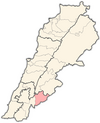Al-Fardis, Hasbaya
Appearance
Al-Fardis
الفرديس | |
|---|---|
village | |
 Sisu XA-180, part of UNIFIL, in Al-Fardis, 1998 | |
| Coordinates: 33°22′19″N 35°40′04″E / 33.37194°N 35.66778°E | |
| Grid position | 143/159 L |
| Country | |
| Governorate | Nabatieh Governorate |
| District | Hasbaya District |
| Time zone | UTC+2 (EET) |
| • Summer (DST) | UTC+3 (EEST) |
| Dialing code | +961 |
Al-Fardis (Arabic: الفرديس) is a small village the Hasbaya District in Lebanon.
History
[edit]In 1838, during the Ottoman era, Eli Smith noted the population of Al-Fardis as Druze and "Greek" Christians.[1]
In 1852 Edward Robinson noted it as a village on the road between Rashaya al-Foukhar and Hasbaya, located directly east of Kaukaba.[2]
In 1875, Victor Guérin noted it as small village, inhabited by "Schismatic Greek" and Druse.[3]
Modern era
[edit]In 1988, when the no:Norbatt part of UNIFIL was stationed there, the village had 500 inhabitants, all Druze.
Demographics
[edit]In 2014 Druze made up 90,46% and Christians made up 8,99% of registered voters in Al-Fardis. The Christian population is Greek Orthodox.[4]
References
[edit]Bibliography
[edit]- Guérin, V. (1880). Description Géographique Historique et Archéologique de la Palestine (in French). Vol. 3: Galilee, pt. 2. Paris: L'Imprimerie Nationale.
- Robinson, E.; Smith, E. (1841). Biblical Researches in Palestine, Mount Sinai and Arabia Petraea: A Journal of Travels in the year 1838. Vol. 3. Boston: Crocker & Brewster.
- Robinson, E.; Smith, E. (1856). Later Biblical Researches in Palestine and adjacent regions: A Journal of Travels in the year 1852. London: John Murray.
External links
[edit]- Fardis Archived 2016-09-19 at the Wayback Machine, Localiban


